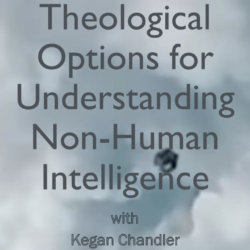Apologetics 3: Theism, Atheism, and Pantheism
In Building Belief, Chad Meister uses a worldview comparison chart to simplify all the religions of the world into three broad categories: theism, atheism, and pantheism. This strategy will help you to compare and contrast five major aspects of these three worldviews, including theology, ontology, epistemology, axiology, and anthropology. Next, you can evaluate each of the three main possibilities on the basis of logic and livability. This way of looking at world religions can especially help you in talking to others about the faith.
If you would like to take this class for credit, please contact the Atlanta Bible College so you can register and do the necessary work for a grade. Here now is lecture three: Theism, Atheism, and Pantheism.
Notes:
worldview: “a collection of beliefs and ideas about the central issues of life…the lens through which we ‘see’ all of reality” (Meister, 39)[1]
- theology: is there a God, if so what is God like?
- ontology: what is ultimate reality?
- epistemology: how do we acquire knowledge?
- axiology: what is the basis for morality?
- anthropology: who are we as human beings (Mesiter, p. 40)
origin, meaning, morals, destiny
- the worldview approach is so helpful because there are thousands of religions and no one would have the time to study and evaluate them all
- since they can be categorized into three main worldviews, we can immediately eliminate huge numbers of them if we can disprove or prove one of these to be correct
- According to Meister, there are three worldviews: atheism, theism, and pantheism
- common objection1: how do you know that Christianity is right and all the other thousands of religions are wrong? how can you be so arrogant?
- common objection2: all religions are just the same anyhow like the blind man and the elephant
| paradigm | atheism | pantheism | theism | |||
| God/gods/divinity (theology) | no supernatural | arguments for God | God is everything; everything is God | if God has a mind then he can’t be a rock; if he doesn’t have a mind then he is not a person | one or more gods exist apart from nature | problem of evil; no empirical test for supernatural beings |
| reality (ontology) | naturalism (big bang + evolution) | big bang needs cause, origin of 1st life, Cambrian explosion | no distinction between creator and creation | why can’t I read minds if there is only one mind? | physical and spiritual realities both exist; spiritual first then physical | God of the gaps |
| knowledge (epistemology) | scientific method | can’t prove logic, can’t understand love or altruism | can’t trust senses; learn through meditation; look with in | then I don’t need to listen to you teach me how to think about pantheism (only ideas I conceive of are true) | knowledge gained through senses (scientific method) and revelation (divine insight) | what about wackos who say God told them to kill their children? |
| morality (axiology/ethics) | socially constructed, determined by evolution | if no absolute source for morals, then why follow them? selfishness leads to dysfunction | evil is an illusion; eliminate attachments | can’t detach from loving my children | God sets absolute standard for right and wrong | Euthyphro dilemma |
| humanity (anthropology) | physical only, electro-mechanical machines | difficult to explain consciousness | spiritual only, physical is a deception | but I know I have a physical body! | both physical and spiritual | brain damage affects personality |
atheism
description:
- theology: no God or supernatural
- ontology: naturalism (big bang + evolution) nothing outside of nature exists
- epistemology: scientific method, empiricism
- question (how does water get into the clouds?)
- hypothesis (water turns into an invisible vapor when it dries and floats upwards)
- design experiment (when I apply heat to water in a jar it will turn into vapor and collect on the top of it)
- analyze results (it happened or not…are there other explanations?)
- axiology: morals are socially constructed or determined by evolution
- anthropology: physical only, electro mechanical machines, no soul, no mind
- Dawkins: “We are survival machines—robot vehicles blindly programmed to preserve the selfish molecules known as genes. This is a truth which still fills me with astonishment.”[2]
- Dawkins: “In a universe of blind physical forces and genetic replication, some people are going to get hurt, other people are going to get lucky, and you won’t find any rhyme or reason in it, nor any justice. The universe we observe has precisely the properties we should expect if there is, at bottom, no design, no purpose, no evil and no good, nothing but blind, pitiless indifference…DNA neither knows nor cares. DNA just is. And we dance to its music.”[3]
evaluation (logic and livability):
- no basis for condemning moral abominations, example conversation:
- don’t you think the Catholic Inquisition was wrong? (torturing Jews for practicing their faith)
- why?
- b/c should not harm others, should not force others to do what they don’t want to do, etc.
- why?
- because it’s wrong
- how do you know it is wrong?
- b/c you have imbibed an ethic based on Christianity, Judaism, Islam, Hinduism, etc….you are basing your moral convictions ultimately on God’s existence
- evolutionary moral argument (herd mentality)
- through the process of evolution we’ve developed morals for the good of our group
- so? if there is no moral law giver, who’s to say I should continue following some primitive herd mentality
- the impulse of evolution is called natural selection, survival of the fittest, might makes right
- the goal is to pass on my genetic material and reproduce myself
- “We are machines built by DNA whose purpose is to make more copies of the same DNA. That is exactly what we are here for. We are machines for propagating DNA, and the propagation of DNA is a self-sustaining process. It is every living object’s sole reason for living.”[4]
- on evolution rape is not only justified but also morally right!
- on evolution sterilizing or annihilating handicapped people is right!
- this is not livable!
- logical argument of objective morals
- if objective moral values exist then there must be a standard by which to judge what is right from what is wrong (torturing children for the fun of it)
- no such standard exists
- objective moral values do not exist
- therefore it is not wrong to torture children for the fun of it!
- Ravi Zacharias video
- Alvin Plantinga’s evolutionary argument against evolution (video?)
- our mental faculties are the way they are because of evolution
- evolution functions on natural selection
- so survivability was the determining factor in forming our mental faculties
- however there is no reason why survivability and reality should coincide
- thus, on evolution there is no reason why we should trust our ability to understand and believe in evolution
- not livable
- C.S. Lewis, “Whenever you find a man who says he does not believe in a real right and wrong, you will find the same man going back on this a moment later. He may break his promise to you, but if you try breaking one to him he will be complaining “It’s not fair” before you can say Jack Robinson.”
- nobody conducts their lives as if there really is not right and wrong except sociopaths
- no ultimate meaning since all is destined to perish in the heat death of the universe
pantheism
Hinduism, Taoism, Buddhism, New Age, Christian Science
description
- theology: all is one, all is God, no qualities can be attributed to God
- ontology: God is the universe, plants, animals, you, me
- epistemology: knowledge is gained through meditation, can’t trust the senses
- yoga exercises and chanting assist meditation
- goal is to experience unity with universe and move beyond illusion of distinction
- Depak Chopra: focus on the space between your thoughts
- axiology: evil is an illusion, stop liking and disliking,
- anthropology: we are part of the universe, part of God, not physical but spiritual beings
evaluation (logic and livability)
- logically contradictory
- we are one with God
- God is the changeless All
- We (God) need to move beyond our ignorance and become enlightened by realizing our own divinity
- but to come to know is to change!
- the universe is impersonal
- but I am part of the universe and I certainly am personal
- ah, but that’s just because you are deceived
- but, can something that is truly impersonal be deceived?
- livability: in practice we do make distinctions between right and wrong
- read the little story on p. 63 starting with “Yes,” she said, “everything…”
- focus on contradictory ideas like what the color green tastes like
- but we’ve already seen how futile it is to deny the law of non-contradiction
theism
description
- theology: God or gods exist apart from nature
- ontology: universe is real, spiritual reality preceded creation
- epistemology: knowledge gained both from senses and from revelation
- axiology: morals are objective and find their grounding in God
- anthropology: both physical and spiritual, body and soul/mind
evaluation (logic and livability)
- problem of evil
- God does not want evil to exist
- God is able to eliminate all evil
- Evil exists
- so long as it is logically possible that God would have reasons to allow evil the argument fails on logical grounds
- no empirical accessibility to God or the soul or miracles
- God cannot be seen, measured, etc.
- no scientific experiment can be used to verify God’s existence
- actually God’s actions are empirically accessible
- non-empirical realities exist (numbers, love, etc.)
——————————-
[1] Chad Meister, Building Belief (Grand Rapids: Baker 2006).
[2] Richard Dawkins, The Selfish Gene: 30th Anniversary Edition (Oxford University Press: 2006), p. xxi.
[3] Richard Dawkins, River Out of Eden (Basic Book: 2008), p. 133.
[4] Richard Dawkins, “The Ultraviolet Garden,” Royal Institute Christmas Lecture, No. 4. 1991.






